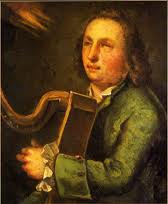Annotation:Landlady (The): Difference between revisions
No edit summary |
m (Text replacement - "garamond, serif" to "sans-serif") |
||
| Line 1: | Line 1: | ||
'''Back to [[{{BASEPAGENAME}}]]''' | '''Back to [[{{BASEPAGENAME}}]]''' | ||
---- | ---- | ||
<p><font face=" | <p><font face="sans-serif" size="4"> | ||
'''LANDLADY, THE.''' Irish, Air (2/4 time). B Flat Major. Standard tuning (fiddle). One part. The tune is attributed to blind Irish harper Turlough O'Carolan (1670-1738), although Donal O'Sullivan, in his definitive work on the bard could find no incontrovertible evidence of its origin. The words were attributed him in the Petrie manuscripts, a convivial lyric in which Carolan proffers a golden guinea to the landlady and calls for drink to toast his sweetheart. The tune seems likely to be Carolan's as well, thought O'Sullivan, although it does bear a strong resemblance to "[[Rose Tree (The)]]" or "[[Rose Tree in Full Bearing (The)]]", which may or may not predate it. | '''LANDLADY, THE.''' Irish, Air (2/4 time). B Flat Major. Standard tuning (fiddle). One part. The tune is attributed to blind Irish harper Turlough O'Carolan (1670-1738), although Donal O'Sullivan, in his definitive work on the bard could find no incontrovertible evidence of its origin. The words were attributed him in the Petrie manuscripts, a convivial lyric in which Carolan proffers a golden guinea to the landlady and calls for drink to toast his sweetheart. The tune seems likely to be Carolan's as well, thought O'Sullivan, although it does bear a strong resemblance to "[[Rose Tree (The)]]" or "[[Rose Tree in Full Bearing (The)]]", which may or may not predate it. | ||
[[File:Carolan.jpg|200px|thumb|left|Turlough O'Carolan]] | [[File:Carolan.jpg|200px|thumb|left|Turlough O'Carolan]] | ||
| Line 7: | Line 7: | ||
<br> | <br> | ||
</font></p> | </font></p> | ||
<p><font face=" | <p><font face="sans-serif" size="4"> | ||
''Source for notated version'': | ''Source for notated version'': | ||
<br> | <br> | ||
<br> | <br> | ||
</font></p> | </font></p> | ||
<p><font face=" | <p><font face="sans-serif" size="4"> | ||
''Printed sources'': '''Complete Collection of Carolan's Irish Tunes''', 1984; No. 196, p. 134. O'Sullivan ('''Carolan: The Life, Times and Music of an Irish Harper'''), 1958; No. 196, p. 212. | ''Printed sources'': '''Complete Collection of Carolan's Irish Tunes''', 1984; No. 196, p. 134. O'Sullivan ('''Carolan: The Life, Times and Music of an Irish Harper'''), 1958; No. 196, p. 212. | ||
<br> | <br> | ||
<br> | <br> | ||
</font></p> | </font></p> | ||
<p><font face=" | <p><font face="sans-serif" size="4"> | ||
''Recorded sources'': <font color=teal></font> | ''Recorded sources'': <font color=teal></font> | ||
</font></p> | </font></p> | ||
Latest revision as of 14:14, 6 May 2019
Back to Landlady (The)
LANDLADY, THE. Irish, Air (2/4 time). B Flat Major. Standard tuning (fiddle). One part. The tune is attributed to blind Irish harper Turlough O'Carolan (1670-1738), although Donal O'Sullivan, in his definitive work on the bard could find no incontrovertible evidence of its origin. The words were attributed him in the Petrie manuscripts, a convivial lyric in which Carolan proffers a golden guinea to the landlady and calls for drink to toast his sweetheart. The tune seems likely to be Carolan's as well, thought O'Sullivan, although it does bear a strong resemblance to "Rose Tree (The)" or "Rose Tree in Full Bearing (The)", which may or may not predate it.

Source for notated version:
Printed sources: Complete Collection of Carolan's Irish Tunes, 1984; No. 196, p. 134. O'Sullivan (Carolan: The Life, Times and Music of an Irish Harper), 1958; No. 196, p. 212.
Recorded sources:
Back to Landlady (The)
